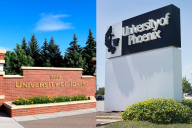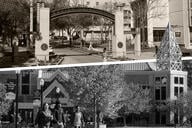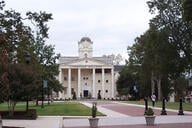You have /5 articles left.
Sign up for a free account or log in.
Two private California institutions -- one secular and in Southern California, the other religious and in Northern California -- are merging.
The University of Redlands on Monday said it plans to acquire the San Francisco Theological Seminary, a 150-year-old Presbyterian seminary. The presidents of the two institutions on Monday said they had signed a memorandum of understanding that will create a graduate school within Redlands that essentially establishes a new campus in the San Francisco Bay Area.
The new Graduate School of Theology will also be the location for course work in a range of fields already offered at Redlands and its other regional campuses, said President Ralph W. Kuncl.
The merger must be approved by the WASC Senior College and University Commission, which accredits both institutions, and by the Association of Theological Schools.
Also, California’s attorney general must sign off on the deal; U.S. Department of Education approval must also be in place to allow students to use federal loans to help pay for their education.
Frank M. Yamada, executive director of the Association of Theological Schools, said that the merger would, if approved, be like most of the 26 other mergers of his members over the last seven years – into a larger university. Such arrangements now comprise about one in 10 ATS schools -- the association accredits 276 institutions.
Most notably, he said, Claremont School of Theology in Los Angeles announced a possible merger with Willamette University in Salem, Ore. And Andover Newton Seminary, one of the nation’s oldest theological schools, is now embedded in Yale Divinity School.
In most cases, he said, the partner school or organization has some sort of religious affiliation, but that’s not a hard-and-fast rule, as with the newest merger.
The merger talks began in late 2017, when SFTS began exploring partnerships, said President Jim McDonald. “We talked to seminaries, we talked to divinity schools -- but we also talked to a couple of colleges and universities,” he said. McDonald met Kuncl in early November and “We immediately hit it off.”
Redlands has a $167.2 million endowment, enrolls nearly 5,000 students and operates six regional campuses in addition to its main location. But it was also looking for new partners. SFTS fit the bill, Kuncl said.
“They of course didn’t begin in the last decade thinking that their path to future success would be through acquisition,” he said. “But it turns out that in this era, that’s a great strategy by which a 150-year-old, venerable institution can preserve its identity and preserve its brand name and all of its values for its students, by becoming embedded and part of a larger institution.”
McDonald, for his part, agreed. “I would say, ‘Absolutely yes’ to that,” he said.
The leaders did not provide financial details on the merger. In a statement, Kuncl later said, “While the boards of both institutions have approved the agreement in principle, several financial details remain privileged. However, both institutions have substantial assets that make this transaction feasible.”
‘What on Earth Would You Be Thinking?’
The two institutions are in different regions of California and basically worlds apart: Redlands is in San Bernardino County, about 60 miles east of Los Angeles, while SFTS is in the Marin County bedroom community of San Anselmo, north of San Francisco.
The seminary actually opened a Pasadena campus in 1990 but closed it in 2011 as part of what it called "a larger and urgent effort to reach financial equilibrium."
Eight years later, Kuncl said the two institutions are a good fit. “I believe we are of the right size to partner with SFTS, sort of ‘Goldilocks size,’ because we’re not so big that we wouldn’t need them or want them -- and we’re not so small that we wouldn’t be financially feasible to embed them within us. So being a midsized university helps, I think, to envision incorporating another school.”
Kuncl noted that there’s a long history of graduate schools of theology being embedded in major universities. “It’s not an unusual thing,” he said. “So we felt like that was actually a visionary and obvious thing to do, not a mysterious thing to do.”
But he admitted that a Presbyterian seminary an eight-hour drive northwest was not an obvious choice.
“That would be the first question asked by any trustee or alumnus or donor,” he said. “‘What on earth would you be thinking about merging with, acquiring a seminary, which is a sacred institution, when the university is a secular institution?’ And that requires a leap of vision into thinking about what we two institutions could create together that is new.”
He said the new graduate school will operate “on equal footing” with Redlands’ other graduate programs in business, education, music and continuing studies.
The campus will also likely offer traditional programming from Redlands’ graduate schools of education, business and music. Redlands also intends to offer an adult student baccalaureate-completion program in conjunction with local community colleges -- he wouldn’t say which. The expansion will also allow it to offer a share of 14 new academic degree programs it already plans to introduce at its various branch campuses in Southern California.
“This increases the footprint of the university into Northern California as well as Southern California,” Kuncl said.
Redlands’ tradition of a broad-based liberal arts education with an emphasis on service is “completely congruent with the values of San Francisco Theological Seminary,” he said. “But the product is going to be much more than practicing ministers in pulpits. It will produce leaders and people with lives of service.”
Both institution’s Boards of Trustees have already approved an eight-page agreement in principle laying out how they’ll eventually operate. Over the next four months, they’ll create a final merger document for the boards to approve in May, Kuncl said.
In the meantime, faculty from the two institutions have already begun meeting quietly -- about 40 Redlands faculty and literally the entire SFTS faculty, which numbers just nine instructors, have formulated models for new multidisciplinary graduate programs that neither institution could have offered previously. The two institutions hope to offer a handful of hybrid degrees such as a master’s degree in divinity and education, in divinity and business, and in divinity and organizational leadership.
Instructors at SFTS’s Applied Wisdom Institute and Redlands’ School of Education have already developed a joint continuing studies program, dubbed the mental health and spirituality certificate, that will begin holding classes next month, the institutions said in a statement.
Kuncl said he has enjoyed watching faculty collaborate across the two cultures. “It’s the fuel that is driving this,” he said.




